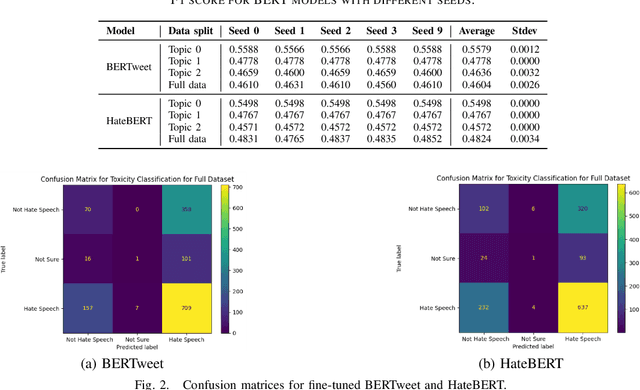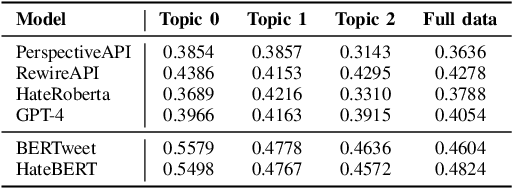Margaret Capetz
Leveraging Large Language Models and Topic Modeling for Toxicity Classification
Nov 26, 2024



Abstract:Content moderation and toxicity classification represent critical tasks with significant social implications. However, studies have shown that major classification models exhibit tendencies to magnify or reduce biases and potentially overlook or disadvantage certain marginalized groups within their classification processes. Researchers suggest that the positionality of annotators influences the gold standard labels in which the models learned from propagate annotators' bias. To further investigate the impact of annotator positionality, we delve into fine-tuning BERTweet and HateBERT on the dataset while using topic-modeling strategies for content moderation. The results indicate that fine-tuning the models on specific topics results in a notable improvement in the F1 score of the models when compared to the predictions generated by other prominent classification models such as GPT-4, PerspectiveAPI, and RewireAPI. These findings further reveal that the state-of-the-art large language models exhibit significant limitations in accurately detecting and interpreting text toxicity contrasted with earlier methodologies. Code is available at https://github.com/aheldis/Toxicity-Classification.git.
Enabling Adoption of Regenerative Agriculture through Soil Carbon Copilots
Nov 25, 2024



Abstract:Mitigating climate change requires transforming agriculture to minimize environ mental impact and build climate resilience. Regenerative agricultural practices enhance soil organic carbon (SOC) levels, thus improving soil health and sequestering carbon. A challenge to increasing regenerative agriculture practices is cheaply measuring SOC over time and understanding how SOC is affected by regenerative agricultural practices and other environmental factors and farm management practices. To address this challenge, we introduce an AI-driven Soil Organic Carbon Copilot that automates the ingestion of complex multi-resolution, multi-modal data to provide large-scale insights into soil health and regenerative practices. Our data includes extreme weather event data (e.g., drought and wildfire incidents), farm management data (e.g., cropland information and tillage predictions), and SOC predictions. We find that integrating public data and specialized models enables large-scale, localized analysis for sustainable agriculture. In comparisons of agricultural practices across California counties, we find evidence that diverse agricultural activity may mitigate the negative effects of tillage; and that while extreme weather conditions heavily affect SOC, composting may mitigate SOC loss. Finally, implementing role-specific personas empowers agronomists, farm consultants, policymakers, and other stakeholders to implement evidence-based strategies that promote sustainable agriculture and build climate resilience.
Leveraging Language Models to Detect Greenwashing
Oct 30, 2023Abstract:In recent years, climate change repercussions have increasingly captured public interest. Consequently, corporations are emphasizing their environmental efforts in sustainability reports to bolster their public image. Yet, the absence of stringent regulations in review of such reports allows potential greenwashing. In this study, we introduce a novel methodology to train a language model on generated labels for greenwashing risk. Our primary contributions encompass: developing a mathematical formulation to quantify greenwashing risk, a fine-tuned ClimateBERT model for this problem, and a comparative analysis of results. On a test set comprising of sustainability reports, our best model achieved an average accuracy score of 86.34% and F1 score of 0.67, demonstrating that our methods show a promising direction of exploration for this task.
 Add to Chrome
Add to Chrome Add to Firefox
Add to Firefox Add to Edge
Add to Edge